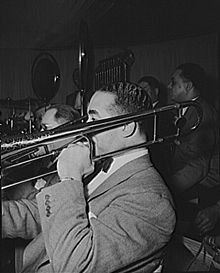Lawrence Brown (jazz trombonist)
This article needs additional citations for verification. (June 2019) |
Lawrence Brown | |
|---|---|
 Lawrence Brown in Duke Ellington's orchestra (1943) | |
| Background information | |
| Born | August 3, 1907 Kansas United States |
| Died | September 5, 1988 (aged 81) Los Angeles, California, United States |
| Genres | Jazz |
| Occupation(s) | Musician, Composer |
| Instruments | Trombone |
| Years active | 1932–70 |
| Labels | Clef Records, Impulse! Records |
| Associated acts | Duke Ellington, Johnny Hodges |
Lawrence Brown (August 3, 1907 – September 5, 1988) was a jazz trombonist from California who best remembered for his work with the Duke Ellington orchestra.[1] Brown was a session musician throughout his career, as well as recording albums under his own name.
Early life[]
Lawrence Brown was born on August 3, 1907, in Lawrence, Kansas.[2] When Brown was about six or seven years old in 1914 his family moved to Oakland, California. He began playing the violin at a young age, but quickly grew tired of it and turned to playing the tuba in his school's band.
Brown came from a musical background – his father was a preacher at the Black American Episcopal church, where he often sang as a part of his sermons. Brown’s mother played the organ and the piano. Brown discovered the trombone while doing janitorial work at his father’s church. He stated that he wanted to replicate the sound of cello on a trombone.
Biography[]
Brown began his career with Charlie Echols and Paul Howard.[2] In 1932, Brown joined Duke Ellington's band.[2] His great technical command of the instrument, with its "creamy tone, neurotic vibrato and range" was featured with Ellington's band every year in compositions such as "Blue Cellophane" and "Golden Cress."
He left Ellington's band in 1951 to join a band led by former Ellington sideman Johnny Hodges, where he stayed until 1955.[2] After leaving Hodges, Brown took a position for five years with CBS as a session player.[2] In 1960, he rejoined Ellington and stayed with him until 1970.[2] After leaving Ellington's band the second time at the age of 63, Brown stopped performing.[2]
He fulfilled many roles in the Ellington Orchestra—as a balladeer, technical soloist, and section leader. His highly melodic ballad playing as well as his fast technical style inspired trombonists from Tommy Dorsey to Bill Harris.
Brown was married to Dorothea Bundrant and actress Fredi Washington. He died in Los Angeles, California, at the age of 81.[1]
On June 25, 2019, The New York Times Magazine listed Lawrence Brown (jazz trombonist) among hundreds of artists whose material was reportedly destroyed in the 2008 Universal fire.[3]
Discography[]
As leader[]
- Slide Trombone Featuring Lawrence Brown (Clef, 1955)
- Inspired Abandon (Impulse!, 1965)
As sideman[]
With Duke Ellington
- Side by Side (Verve, 1959)
- The Nutcracker Suite (Columbia, 1960)
- Paris Blues (United Artists, 1961)
- Piano in the Background (Columbia, 1962)
- Duke Ellington Meets Coleman Hawkins (Impulse!, 1963)
- Afro-Bossa (Reprise, 1963)
- The Great Paris Concert (Atlantic, 1963 [1973])
- The Symphonic Ellington (Reprise, 1963)
- Ellington '65 (Reprise, 1964)
- Ella at Duke's Place (Verve, 1966)
- Duke Ellington's Concert of Sacred Music (RCA Victor, 1966)
- The Popular Duke Ellington (RCA Victor, 1966)
- Far East Suite (RCA Victor, 1967)
- Ella and Duke at the Cote D'Azur (Verve, 1967)
- ...And His Mother Called Him Bill (RCA 1968)
- Second Sacred Concert (Fantasy, 1968)
- Yale Concert (Fantasy, 1968 [1973])
- 70th Birthday Concert (Solid State, 1970)
With Jackie Gleason
- Jackie Gleason Presents the Torch with the Blue Flame (Capitol, 1958)
- Presents Opiate D'Amour (Capitol, 1960)
- Jackie Gleason Presents Lazy Lively Love (Capitol, 1960)
With Johnny Hodges
- Memories of Ellington (Norgran, 1954)
- Creamy (Norgran, 1955)
- Dance Bash (Norgran, 1955)
- Ellingtonia '56 (Norgran, 1956)
- In a Tender Mood (Norgran, 1956)
- Not So Dukish (Verve, 1958)
- Johnny Hodges with Billy Strayhorn and the Orchestra (Verve, 1962)
- Everybody Knows Johnny Hodges (Impulse!, 1964)
- Joe's Blues (Verve, 1965)
- Wings & Things (Verve, 1965)
- Blue Pyramid (Verve, 1966)
- Wild Bill Davis & Johnny Hodges in Atlantic City (RCA Victor, 1967)
- Triple Play (RCA Victor, 1967)
With others
- Leonard Bernstein, What Is Jazz (Columbia, 1956)
- Ruby Braff, Braff!! (Epic, 1957)
- Earl Hines, Once Upon a Time (Impulse!, 1966)
- Jo Jones, The Jo Jones Special (Vanguard, 1955)
- Frankie Ortega & Sy Oliver, 77 Sunset Strip and Other Selections (Jubilee, 1959)
- Rex Stewart, Rex Stewart and the Ellingtonians (Riverside, 1960)
- Big Joe Turner, The Boss of the Blues Sings Kansas City Jazz (Atlantic, 1956)
- Big Joe Turner, Big Joe Rides Again (Atlantic, 1960)
- Guy Warren, Themes for African Drums (RCA Victor, 1959)
- Cootie Williams & Rex Stewart, The Big Challenge (Jazztone, 1957)
- Cootie Williams & Rex Stewart, Porgy & Bess Revisited (Warner Bros., 1959)
References[]
- ^ Jump up to: a b "Lawrence Brown | Biography & History". AllMusic. Retrieved July 25, 2021.
- ^ Jump up to: a b c d e f g Colin Larkin, ed. (1992). The Guinness Who’s Who of Jazz (First ed.). Guinness Publishing. p. 64. ISBN 0-85112-580-8.
- ^ Rosen, Jody (June 25, 2019). "Here Are Hundreds More Artists Whose Tapes Were Destroyed in the UMG Fire". The New York Times. Retrieved June 28, 2019.
External links[]
- Allmusic review of Slide Trombone
- Lawrence Brown recordings at the Discography of American Historical Recordings
- Steinman, Michael. "Beautifully Polished Brass". Jazz Lives. Retrieved May 21, 2015.
- 1907 births
- 1988 deaths
- African-American jazz musicians
- American jazz trombonists
- Male trombonists
- Swing trombonists
- Jazz musicians from California
- Duke Ellington Orchestra members
- Impulse! Records artists
- American session musicians
- 20th-century American musicians
- 20th-century trombonists
- American male jazz musicians
- 20th-century American male musicians